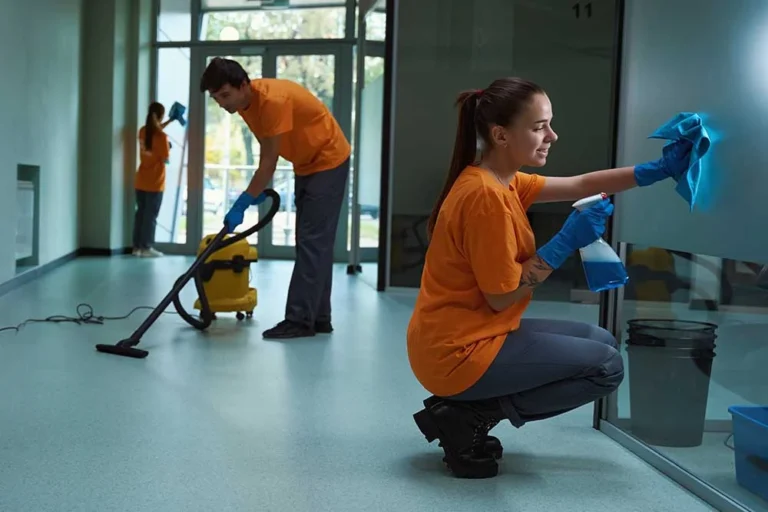Best Natural Cleaning Solutions You Can Make at Home in 2024
Best Natural Cleaning Solutions You Can Make at Home in 2024
Introduction
Unlock the secrets of your pantry and discover the power of natural ingredients for an eco-friendly and effective home clean.
Creating natural cleaning solutions at home is not only cost-effective but also environmentally friendly and gentle on your health.
Key Takeaways:
- Home-made cleaning solutions can outperform commercial products when it comes to environmental sustainability.
- Mixing basic ingredients like vinegar, baking soda, and lemon can yield potent cleansers for various household surfaces.
- Home-made cleaning solutions are cost-effective, with the potential to save households significantly on cleaning expenses.
- DIY natural cleaners often use fewer chemicals, reducing health risks and indoor air pollution.
- Customizable cleaning recipes allow you to create solutions that cater specifically to your home’s needs and preferences.
- Natural cleaners contribute to decreasing the overall demand for harsh chemical products, supporting global eco-friendly initiatives.
The Environmental Impact of Commercial Cleaning Products
The meticulous sheen and sterile aroma of a professionally cleaned space bear testament to the prowess of commercial cleaning products. Far less visible is the latent toll these solutions can impart upon our planet’s delicate ecosystems and biodiversity. Commercial cleaners, laden with potent chemicals, come with a price that transcends their purchase cost, siphoning through waterways and soils, leaving an indelible mark on our environment.
Navigating through the aisles of any maintenance supply store
Managers are faced with a surreal gallery of cleaning agents, each promising unmatched potency. These products, however, often contain compounds such as phosphates, ammonia, and a multitude of non-biodegradable substances – culprits known to disrupt aquatic life and contribute to pollution cycles that affect far-reaching corners of the biosphere. The results of these actions are a cautionary tale of disrupted habitats and a strangled biodiversity struggling under the yoke of human progress.
Yet, hope thrives in the folds of innovation
The pivot towards natural cleaning solutions echoes an ideology that aligns commercial exigencies with eco-friendly stewardship. Incorporating simple, biodegradable, and non-toxic ingredients like vinegar, citric acid, and baking soda, these DIY solutions offer a pragmatic blueprint for businesses to operate sustainably without sacrificing the hygiene standards that their patrons have come to expect. Engaging such strategies is not merely environmentally conscious but financially astute, as an increasing demographic of clients now gravitate towards enterprises that have an earth-based ethos.
Such a transition is not without its challenges
The sprawling tapestry of our modern industrial landscape has been woven with threads of efficiency and expediency, often at nature’s expense. Reversing this narrative asks for an investment in education and a commitment to innovation. It may mean retraining staff, exploring novel cleaning techniques, and, crucially, recalibrating our measure of success to encompass outcomes that do not readily translate into fiscal figures. But the rewards are comprehensive, as a cleaner, more stable environment underwrites a healthier society and a resilient economy.
In Germany, commercial cleaning services form the bulwark of the facility management market, with nearly 700,000 individuals engaged in the sector, underscoring both its economic and contextual importance within the broader trade spheresource. This immense influence imparts a responsibility to lead in sustainable practices.
As proprietors of businesses and stewards of public spaces
We possess a profound agency to sway the tide of environmental impact. By electing to incorporate eco-friendly tips into our cleaning regimens, not only do we preserve the aesthetic and physical integrity of our workspaces, but we also partake in a larger movement. One that gently but steadfastly steers the course towards a future where commercial cleaning does not come at the cost of the world we so deeply cherish. And, as we tirelessly strive to elevate our service quality and customer satisfaction, let us remember that true excellence lies in a legacy that fortifies, rather than diminishes, the natural world.
Simple Ingredients, Complex Chemistry
Exploring the Science Behind Everyday Items Like Vinegar and Their Cleansing Properties
In the quest for a sanitary and appealing business environment, the allure of harsh chemical cleaners with their promises of germ annihilation is tangible. Yet, in our hands and cupboards lay humbler agents with astonishing chemistry – vinegar, baking soda, lemon – the unassuming trinity that is reshaping our approach to natural cleaning.
At its essence, vinegar is a diluted solution of acetic acid and water, a concoction that Mother Nature engineers through the fermentation of sugary liquids. This acetic acid, even in diluted form, possesses potent antimicrobial properties, making vinegar a stalwart ally against common pathogens. But its cleaning prowess extends further; the acidity of vinegar effortlessly dissolves mineral deposits, cuts through grease, and neutralizes odors, making it a versatile cleanser, particularly for glass and hard surfaces.
Moreover, baking soda, or sodium bicarbonate, is a mild alkaline powder that acts as a gentle abrasive, lifting dirt without scratching. When married with vinegar, the ensuing reaction releases carbon dioxide, resulting in a fizzing action that can dislodge grime from the most obstinate of nooks.
Recipes for All-Purpose Cleaners Using Household Staples
Turning to DIY solutions, we find ourselves concocting elixirs that rival their commercial counterparts in efficacy. A classic all-purpose cleaner can be forged by combining equal parts water and vinegar, uplifted by a squeeze of lemon juice for its citric acid and fresh fragrance. This solution, when dispensed in a spray bottle, becomes a formidable tool against a multitude of contaminants. For tougher tasks, a paste of baking soda with a splash of water invites itself as a scrub for stained sinks and sullied surfaces – a testament to simplicity and effectiveness. For an aromatic touch and additional disinfectant quality, a few drops of essential oils like tea tree or eucalyptus can be introduced into the mix.
These homemade cleaners serve beyond mere cleanliness; they embody the spirit of sustainability and a gesture of care to the many hands busy in our businesses – safe from the harshness of more abrasive substances. And while budgetary considerations perpetually linger in the calculus of business operations, these eco-friendly tips champion both frugality and environmental responsibility. The cost-effectiveness of natural ingredients, often already stockpiled for other purposes, yields substantial savings over time compared to frequently purchased commercial cleaners[source].
By embracing the complex chemistry of simple ingredients, we not only safeguard our premises but also contribute to a healthier ecosystem for customers and employees. Thus, we encourage the integration of these humble yet powerful cleaning solutions, and our journey towards a greener, safer, and more cost-efficient cleaning protocol continues.
Economics of Home-Made Cleaners
When considering the financial stewardship of any business, the calculus of cleaning supplies may not immediately rise to the top of the agenda. However, the impact of choosing between commercial cleaning supplies and home-made alternatives can have a significant bearing on both the balance sheet and operational efficiency of a company. Let’s embark on an in-depth exploration of the cost-benefit analysis of DIY solutions versus store-bought products and reveal the long-term savings achieved by opting for home-made cleaners.
Financial Comparison: Store-Bought vs. DIY
Commercially available cleaning products, while readily accessible and effective, come with a cost markup reflecting manufacturing, branding, marketing, and distribution expenses. These costs are inevitably passed onto the consumer – in this case, the business purchaser. Such expenses are juxtaposed with the modest price tags of basic ingredients like vinegar, baking soda, and lemon juice, staples of home-made cleaning concoctions.
An analysis of our expenditures would likely reveal savings of considerable margins when switching to natural cleaning solutions. It’s not just about the sticker price; it’s also about versatility. A single bottle of vinegar, for instance, can play many roles – from window cleaning to descaling kettles – replacing an array of specialized and often more expensive commercial products.
Long-Term Savings
While one-off costs might seem minuscule, in the grand scheme of annual budgets, they accumulate, affecting a business’s financial health. In a study that evaluated the necessity of professional cleaners in commercial settings, businesses were found to increasingly recognize the value and affordability of such services, shifting toward solutions that tailored to their specific needs.
In the long term, the adoption of DIY cleaning supplies promises not only immediate savings but also the reduced need for frequent re-stocking, thanks to the efficacy and multi-purpose nature of simple, home-made solutions. Additionally, businesses mitigate the risks of price fluctuations in the commercial cleaning market by relying on more stable, widely available, and low-cost pantry items. Moreover, investing in these economical and eco-friendly practices builds goodwill among an ever-growing demographic of environmentally conscious customers, potentially driving up client retention and brand loyalty – intangible benefits that nonetheless have real financial implications.
In summary, converting to home-made cleaning solutions not only aligns businesses with a global trend toward sustainability but also presents a practical, cost-effective strategy in maintaining their facilities. It is a prime example of how small changes in our procurement and operational habits can lead to significant financial savings, showcasing the power of purposeful decision-making in the complex world of business economics.
Health Benefits of Natural Cleaners
The dialogue around workplace wellness has reached a crescendo, with businesses becoming increasingly proactive about fostering environments that bolster well-being. Within this context, the choice of cleaning agents is pivotal; it’s not merely a matter of surface aesthetics but of healthful surroundings. The health benefits of natural cleaners, as opposed to their chemical-laden counterparts, are indeed manifold and merit close consideration. Limiting Exposure to Harmful SubstancesCommercial cleaning products frequently contain an arsenal of harsh chemicals, from potent disinfectants like quaternary ammonium compounds to volatile organic compounds (VOCs) that can off-gas into the environment. Prolonged exposure to these substances is linked with a spectrum of health concerns, from respiratory irritation to long-term organ damage, depending on the chemical in question and the degree of exposure.By transitioning to natural cleaning solutions, businesses can drastically reduce the presence of harmful agents in their environments. Simple, everyday items – vinegar, baking soda, lemon – usurp the role of toxic chemicals, bringing their naturally derived efficacy to the fore without the accompanying risk to human health. This shift is not merely a preventative measure but an investment in the long-term well-being of both employees and clients. After all, a workplace that demonstrably values health is one that engenders loyalty and positive associations.
The Positive Effects on Indoor Air Quality and Personal Well-Being
The switch to natural cleaning agents has a direct and positive impact on indoor air quality. Traditional cleaning products can compromise air purity, banishing an invisible cloud of hazardous particles. In contrast, DIY solutions enhance the air we breathe with innocuous, often neutral or naturally pleasant scents. In a study framing the necessity of professional cleaners, it was found that businesses are concerned with not only the cleanliness but also the very air within their establishments, recognizing this as integral to overall service quality. What’s more, the psychological dimension of using eco-friendly tips and products is significant. There’s a degree of reassurance and comfort in knowing that the environment is maintained with safe, natural substances, which can increase overall satisfaction and morale.In today’s market, where businesses compete not just on products and services but on their corporate culture and societal impact, embracing the health benefits of natural cleaners can become a strong part of a company’s narrative. It resonates with a growing consumer base that is both health-conscious and environmentally aware. Consequently, the choice of cleaning agents becomes an extension of the brand’s values and a tangible demonstration of its commitment to health and sustainability.Natural cleaning presents a compelling case for improving not only the cleanliness of workplaces but also the well-being and satisfaction of everyone who interacts with those spaces. It underlines that health considerations and business acumen can, and indeed should, go hand in hand, steering enterprises towards a future where good health is the norm, rather than the exception.
Tailored Cleaning for Every Corner of Your Home
In the world of cleanliness, one size does not fit all. Every area of a home or business has unique cleaning needs, and when it comes to spaces frequented by children or pets, the stakes are even higher. Traditional cleaning products, while universal in their application, are often laced with chemicals that can pose risks to the most vulnerable. Therein lies the beauty of home-made cleaners – they can be designed, mixed, and matched to each unique space and its inhabitants, ensuring both safety and cleanliness.
Creating Specific Blends for Kitchen, Bathroom, Living Areas, and Others
The kitchen, the heart of any home or business, witnesses a flurry of activity and requires a potent cleaner that cuts through grease and food residues without leaving behind harmful residues. A combination of citrus, such as lemon for its degreasing properties, and distilled vinegar to sanitize surfaces, can work wonders.
Moving on to the bathroom, where the concern for hygiene peaks, a baking soda and vinegar paste can combat lime scale and mildew, which often take refuge in such damp environments. This mixture also serves as a cost-effective solution that can replace multiple commercial products.
Living areas and offices, spaces meant for respite or productivity, demand an ambiance free from the harsh odors of chemicals. A spray made with essential oils, not only leaves behind a soothing aroma but also packs a gentle cleansing punch—a plus for creating an inviting atmosphere.
For areas that see the littlest feet and paws, gentleness is paramount. A simple mixture of warm water and mild castile soap becomes a safe and effective floor cleaner. For cleaning up after pets, a sprinkle of baking soda before vacuuming neutralizes odors without introducing any harm to the pet or environment.
Adapting Cleaning Solutions to the Needs of Households with Children or Pets
Learning from actual studies, households increasingly demand services that cater to specific requirements. The benefits of such tailored cleaning solutions are clear – reduced health risks from toxic substances and enhanced safety for all family members, especially children and pets, who are more susceptible to the effects of harsh chemicals.
In the case of spillages or incidents – inevitable with children and pets – quick and harmless fixes are essential. A natural disinfectant made from equal parts water and vinegar, with a touch of hydrogen peroxide, can be sprayed directly onto the affected area, providing a rapid response to accidents.
Businesses serving families also stand to gain from embracing this targeted strategy, differentiating themselves through a commitment to health-conscious cleaning practices. It aligns with the growing clientele that prioritizes safety and well-being above all when it comes to their living and working environments.
In essence, the pivot to natural cleaning infers a notable forward step in the intricate dance of home maintenance. It’s about utilizing the offerings of nature – baking soda, vinegar, lemon, among others – to concoct a range of safe, bespoke solutions that respect varied needs, surfaces, and scenarios within our cherished abodes and business premises. This approach is not merely a nod to environmentalism or a health-conscious trend but, more importantly, a sustainable, tailored practice that yields a harmonious and healthy habitat for everyone.
Impact on the Community and Beyond
The choice to adopt natural cleaning solutions transcends the confines of a single home or business and burgeons into a movement that can revolutionize the well-being of entire communities. Such a shift is vital not only for environmental reasons but also for catalyzing a broader societal transition towards sustainability. The wide-ranging influence of going green with our cleaning routines can set the tone for individual and collective efforts in promoting eco-conscious trends on a global scale.
How Choosing Natural Solutions Can Inspire a Community-Wide Shift Towards Sustainability
Embracing more sustainable living practices, including natural cleaning methods, doesn’t just provide immediate health benefits; it also plants the seeds of a greener future. As businesses and individuals opt for DIY solutions, the demand for harsh chemical-based products diminishes, reducing the ecological footprint. This shift has a domino effect – one that can spur a larger conversation on how we care for our surroundings.
The Role of Individuals in Promoting Eco-Conscious Cleaning Trends Globally
On a global stage, the impact magnifies. Foregoing conventional cleaning products in favor of natural alternatives is a statement that crosses borders, joining a choir of international voices calling for sustainable practices. When these choices are made by those who influence – business leaders, entrepreneurs, community organizers – they set a precedent. The influence can shape policies, provoke industry changes, and birth initiatives that champion the environment.
Each individual’s choice, when mirrored by millions, can usher monumental shifts. It normalizes environmentally friendly cleaning, making it a standard rather than an exception. Such normalization brings with it innovation – the creation of new products, services, and systems all striving for sustainability. By fostering these eco-conscious trends, not only do we safeguard our planet, but we also ensure that businesses remain relevant and competitive in an increasingly green-oriented economy.
The implications of these shifts are documented. Researchers have recognized the correlation between customer expectations and the performance of commercial cleaning services. Such studies shed light on the market’s evolving standards, indicating a preference for services that prioritize eco-friendliness alongside quality and affordability.
When solidified into habits, these green practices bolster a collective identity that is attuned to the planet’s cries for help. They fortify a culture where the well-being of the community and the world becomes part of what defines us – a step into a future where our lifestyles are testimony to humanity’s capacity for conscientious stewardship.
The transformative power of choosing natural cleaning methods signifies much more than a mere trend. It is the compass that can guide us towards an era where sustainable living is the norm, and our communities – from the smallest neighborhoods to the grand scale of nations – thrive in harmony with the health of our shared planet.
Taking the Next Step Towards a Green Home
As the global consciousness tilts towards ecological sustainability, businesses and homes alike are advancing towards greener living spaces. Natural cleaning solutions sit at the heart of this shift, but they are merely the cornerstone of a much larger edifice of eco-friendliness. Let’s explore the complementary steps that can amplify the impact of natural cleaning and foster a culture of sustainability within our communities.
Complementary Measures for a Fully Eco-Friendly Home
Beyond the choice of cleaning agents, several measures can fortify our commitment to an eco-friendly home. This comprehensive approach includes:
- Reducing waste and promoting recycling: By minimizing disposable items and advocating for recycling, we trim down the volume of refuse that strains our landfills and oceans. Zero-waste strategies dovetail perfectly with natural cleaning, which often uses biodegradable ingredients and minimizes plastic packaging.
- Energy efficiency: Adopting appliances and practices that conserve energy reduces the overall environmental impact of maintaining a home or business. Combining this with natural cleaning, we are allowing our spaces to not only look clean but be intrinsically aligned with the health of our environment.
- Conserving water: Water is a precious resource, and its conservation should be central to our cleaning routines. Employing methods that use less water, or repurposing greywater for cleaning, aligns with the spirit of natural and sustainable living.
- Using sustainable materials and supplies: Whether it’s choosing microfiber cloths over paper towels or purchasing supplies with minimal environmental footprints, every detail contributes to the larger goal of sustainability.
Opportunities for Community Involvement and Education on Green Practices
For a true community-wide transformation, engagement and education are key. Companies can play an influential role by:
- Hosting workshops and sharing resources: Imparting knowledge about natural cleaning and other green practices will empower others to make informed decisions. It’s about sharing recipes for cleaning solutions, tips for sustainability, and wisdom on eco-friendly living.
- Collaborating with local initiatives: By partnering with environmental groups and initiatives, businesses can spread green practices through collective action. It’s an exchange — bringing the expertise of eco-cleaning to the table, and learning from the broader experience of community-based sustainability efforts.
- Advocating for policy changes: Engage in dialogue with local authorities to steer policies towards green practices. Businesses have the clout to catalyze change, and by voicing out, they can pave the way for environmentally positive urban planning and regulations.
- Leading by example: Practice what’s preached. As a business, showcasing a green policy – from the procurement of supplies to the daily maintenance – serves as a real-life model for others to emulate.
Sailing towards sustainability isn’t a voyage we undertake alone. It requires the collective will of businesses, individuals, and communities. By complementing DIY solutions with a broader eco-friendly approach and taking an active part in community education and engagement, we contribute not only to the health of our immediate environment but also to the global ecosystem. It’s more than a strategic business stance – it’s our shared responsibility towards future generations, and every step counts on this journey towards a greener, cleaner world.
Conclusions
As we have navigated through the transformative journey of integrating natural cleaning solutions into our homes and businesses, we arrive at a compelling conclusion. Adopting natural cleaning practices is not merely a trend but a steadfast commitment to nurturing a healthy, cost-efficient, and ecologically sound environment. These solutions stand as a testament to our capacity to harmonize our lifestyles with the planet’s wellbeing.
Natural Cleaning Philosophies
Natural cleaning philosophies echo the growing sentiment of responsibility towards our shared earth. In our homes, workplaces, and broader communities, the benefits are multifaceted—a testament to the potency of simplicity. Utilizing ingredients like vinegar, baking soda, and lemon, we have crafted DIY solutions that shield us from the often hidden dangers of synthetic chemicals while delivering robust cleaning efficacy.
The data speaks volumes; engaging in eco-friendly tips and practices reflects a prudent approach to financial stewardship and environmental custodianship. Over time, the savings become apparent, not just in the coffers of our businesses, but in the health of our employees and clientele. The durability of assets, the efficiency of operations, and the brand’s image are all tangibly uplifted.
In the fabric of community well-being, our choices reverberate. They inspire and foster sustainable living, drawing on the collective strength of individuals and businesses alike to fortify a greener future. From tailored cleaning solutions respectful of every nook at home to robust community-wide environmental initiatives, our steps towards a green home set the stage for broader ecological impacts. Our individual efforts aggregate into a global push for responsible living.
We urge you, our fellow enterprises and custodians of communal spaces, to start exploring the realm of natural cleaning today. Embrace a lifestyle harmonious with our precious biosphere. We invite you to consider how your business can play a pivotal role in this green revolution. Let your spaces be the canvas upon which eco-friendly practices paint a brighter, cleaner future. For those ready to embark on this journey, or who wish to delve deeper into the world of professional cleaning services, we extend an invitation to explore our array of services. Discover more about our commitment to sustainability and how we can aid you in not only maintaining impeccable spaces but doing so with the utmost respect for our environment.
In taking this step, you join a collective endeavor that transcends individual gain—impacting our communities and echoing across the globe. It’s a movement towards health, sustainability, and longevity, encapsulating the very essence of ecological consciousness. Let us stride forward together, towards a horizon where every action is intertwined with the pulse of our planet—a world where the decision to clean naturally is as inherent as the earth beneath our feet.
Frequently Asked Questions (FAQ):
Can natural cleaners disinfect surfaces as well as commercial products?
Many natural ingredients have disinfectant properties that are effective for everyday cleaning and safe for most surfaces.
Will DIY cleaners leave a residue or cause damage over time?
If used in the right proportions, natural cleaning solutions should not leave residue or damage surfaces. Testing on a small area is always recommended.
How can I increase the effectiveness of homemade cleaners?
You can enhance the cleaning power by using essential oils with antibacterial properties or by adjusting the ingredient ratios for tougher jobs.
What are the best natural ingredients for making my own cleaning solutions?
Common ingredients include white vinegar, baking soda, lemon, and castile soap, each serving different cleaning purposes.








